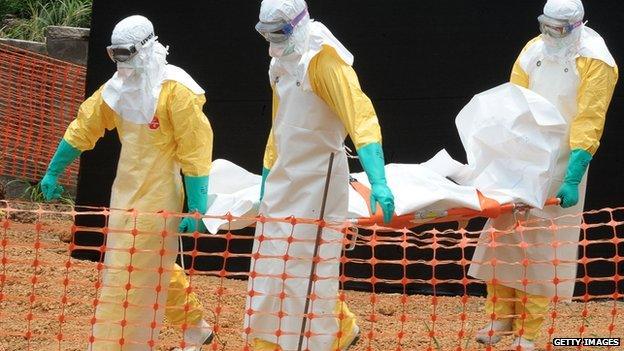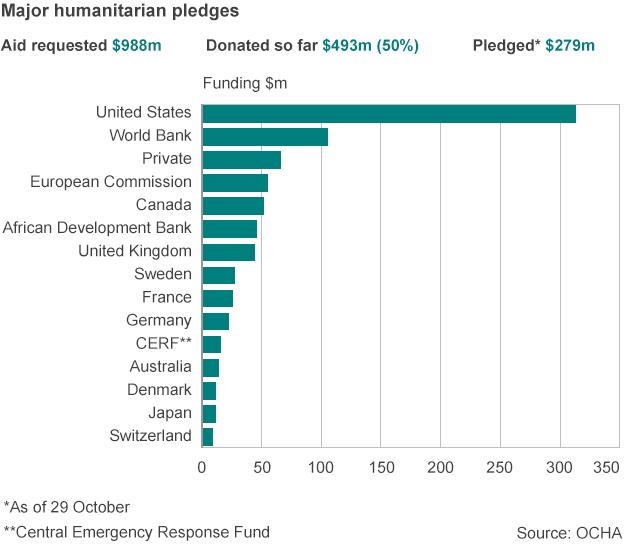UK government to match £5m of public's Ebola donations
- Published

Ebola has been most prevalent in Sierra Leone, Liberia and Guinea
The UK government is to match the first £5m of donations made by the public to a Disasters Emergency Committee appeal for the Ebola crisis in West Africa.
Announcing the move ahead of the appeal being broadcast on Thursday, International Development Secretary Justine Greening said doing so will help the money go "twice as far".
The "unprecedented" outbreak "requires a huge global response", she said.
It is the first time the DEC has sought funds over a disease outbreak.
The DEC - a group of 13 UK aid charities - said the public appeal for money is "a sign of how serious the situation has become".
Ebola has killed almost 5,000 people and infected more than 10,000 in West Africa since the start of the year.
DEC appeals are due to be made via all the main UK broadcasters.
'Pound-for-pound'
Ms Greening said the UK government would match the first £5m of donations "pound-for-pound".
"The British people have always shown immense generosity in situations like these, with hundreds of our health workers having already volunteered their services," she added.
Saleh Saeed, Disasters Emergency Committee: ''This is a race against time''
In its 50-year history, the DEC has launched appeals for humanitarian disasters caused by floods, famines, earthquakes, typhoons and conflicts, but not previously for a disease outbreak.
Announcing the appeal, DEC chief executive Saleh Saeed said the "explosive nature of the disease" had caused a "humanitarian catastrophe".
"That has compelled the DEC to respond and help by ensuring that we are able to support people to stop the spread of Ebola before it becomes a major global catastrophe," he said.
He added that member agencies faced a shortfall of £69m to carry out their work in West Africa.



Of the 13 DEC charities, 11 are currently supporting work or planning to respond to the Ebola crisis in West Africa, with the majority of work focused on stopping the spread of the disease and providing support to those affected.
The committee says £25 can provide cleaning kits including bleach, soap and a bucket for three families at risk from Ebola.
Basic protective clothing for three volunteers supporting people under quarantine can be provided for £50 and £100 can buy training for a community on how to keep itself safe from Ebola.
It comes as the World Health Organization (WHO) says there could be 5,000-10,000 new cases of the deadly virus every week in the worst affected countries by December. Infection rates continue to grow in Guinea and Sierra Leone.
However, there has been a decline in the spread of Ebola in Liberia - the country hardest hit in the outbreak - the WHO's Bruce Aylward said.
The new number of cases globally was 13,703, he said, adding the death toll, to be published later on Wednesday, would probably pass 5,000.
Mr Saeed also warned of other risks in West Africa as health workers focus on fighting Ebola.
He said: "The health service in West Africa was virtually on the edge of collapse already. Now with the Ebola outbreak, unfortunately it means that other patients are not getting the care they need, whether it be pregnant ladies or those who have contracted HIV/Aids or malaria."

Other causes the committee has raised money for:
A total of £71m was raised by the Pakistan Floods Appeal which affected more than 18 million people. The floods swept across the country in July and August of 2010
The UK public donated £95m for the Phillipines Typhoon Appeal which has to date helped more than 900,000 people. The appeal was launched in November 2013
The Syria Crisis Appeal opened in March 2013 and has raised about £25m
An appeal for people affected by the fighting in Gaza was launched in January 2009 and raised £8.3m
A total of £107m was raised for people adversely affected by the earthquake in Haiti

In the US, two medical workers in Dallas, Texas, who treated a patient - who later died - tested positive for Ebola but have been released from hospital after treatment.
Spanish nurse Teresa Romero was the first person to contract the virus outside West Africa. She was part of a team of about 30 staff at the Carlos II hospital in Madrid looking after two missionaries who returned from Liberia and Sierra Leone after becoming infected.
Germany, Norway and France and the UK have all treated patients who contracted the virus in West Africa.

Ebola virus disease (EVD)
How Ebola survivors’ blood is saving lives
Symptoms include high fever, bleeding and central nervous system damage
Spread by body fluids, such as blood and saliva
Fatality rate can reach 90% - but current outbreak has mortality rate of about 70%
No proven vaccine or cure
Fruit bats, a delicacy for some West Africans, are considered to be virus's natural host

To make a donation to the DEC Ebola Crisis Appeal visit www.dec.org.uk, external